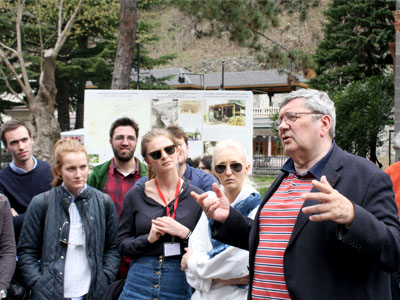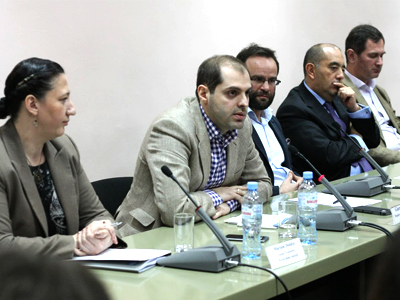- Details
Borjomi was the final stop and the highlight on a four-day anticorruption program ISET organized for students and faculty of its partner university, the Norwegian School of Economics (NHH) in Bergen. The tour was hosted by Borjomi LTD, producer of Georgia’s most famous mineral water – the “Coca Cola of the Soviet Union”, in the words of Jacques Fleury, the company’s former CEO. Mr. Fleury had personally greeted ISET and NHH participants on Borjomi’s premises.
Held on Saturday, April 9, the visit started with a study tour of Borjomi’s Factory #1, allowing the group to observe the entire bottling process. The factory had recently received a very large investment allowing to greatly expand and fully automate the entire production process. With a capacity of more than 100,000 bottles per hour, today’s Borjomi is selling a very large share of its output in the former USSR market where its water is considered a major premium brand.
- Details
Held on April 8, this discussion was a part of the four-day anti-corruption program ISET organized for a large group of students and faculty from ISET’s partner university, Norwegian School of Economics (NHH) in Bergen. The expert panel included Jacques Fleury, former CEO of Borjomi LLC and JSC Château Mukhrani; Mariam Dolidze, Senior Economist at World Bank Georgia; Archil Bakuradze, Chairman of Supervisory Board at JSC Crystal Georgia; Bruno Balvanera, Resident Representative of EBRD Georgia; Giorgi Oniani, Deputy Executive Director of Transparency International Georgia; and ISET President Eric Livny, who also moderated the discussion.
The discussion started with an overview of Georgia’s emergence from the state of civil war, lawlessness and corruption, as illustrated by Jacques Fleury’s story of rebuilding Borjomi– Georgia’s leading mineral water company – in a “legal” environment in which the courts were a private business like any other. Mariam Dolidze underscored Georgia’s post-Rose Revolution achievements in business-friendly reforms, as reflected in its progress in the World Bank’s Doing Business and other international rankings. She also listed outstanding challenges such as judicial system reforms, labor qualifications, (external) market size and infrastructure.












